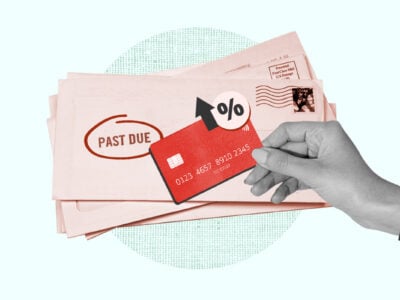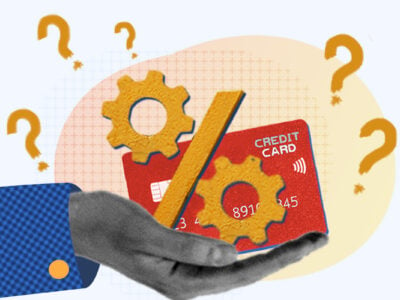Many of us regularly use credit cards, but a high interest rate can quickly turn a small balance into an unmanageable one. If you’ve looked at your credit card statement and been taken aback by your monthly statement, you might be wondering how much credit card is too much and how you can stop credit card interest charges from spiraling the problem out of control.
Read on to find out how you might be able to lower your credit card interest rate with a simple phone call.
Table of Contents
To get good APR on your credit card, follow these 4 steps:
Step 1: Assess your financial situation
First, take stock of your finances (e.g., your normal income, expenses, total assets, and liabilities). Understanding where your finances stand will help you evaluate any options your credit card company offers.
In particular, note any recent changes in your financial situation, like a job loss or pay cut. You’ll want to mention these to your credit card issuer when you get in touch with them.
Before contacting your credit card issuer, you should also collect the following information:
Your credit card balances
Write down your current balances on all of your credit cards. The ones with the highest balances should be your first priority, since you can save more money by lowering your interest rate on them.
Your current APR
Your credit card issuer will often refer to your annual percentage rate (APR) rather than your interest rate directly. A credit card’s APR is the yearly rate of interest. To estimate your daily rate, divide your APR by 365 (or by 12 for your monthly rate).
You can find out your APR by checking your credit card statement or accessing your account online. Write this number down, as you’ll have to refer to it when you’re negotiating.
Your payment history
The ideal time to request lower interest rates from a lender is after you’ve made on-time payments to them for 12 months or more.
Before you request a lower interest rate, check your payment history to see whether you’ve built up a respectable history with the lender in question. If your payment history with them is very short or full of black marks, you might want to wait a while before opening your negotiations.
Step 2: Check your credit score
After you’ve evaluated your finances, check your credit. Lenders are more willing to accommodate borrowers with good credit, so if you know you have a good credit score, it will give you more bargaining power.
You might be able to get your credit score for free from your credit card issuers or your bank—log into your online account to check. If they don’t offer your score, you can go to AnnualCreditReport.com to access your credit reports for free once every 12 months. The reports you receive will include your credit score.
If your credit score needs improvement, it might be worth trying a few credit hacks to raise your score quickly. Alternatively, you can postpone your attempt to lower your APR, spend some time building your credit with longer-term strategies, and try again in a few months to a year.
Step 3: Compare competing offers
Once you know where you stand regarding your finances and your credit score, research the current credit card market.
Look up credit cards that are similar to yours and check what APRs they offer. If you find a card with a better rate than the one you have, it will provide leverage when you negotiate, as your current card issuer will want to keep you from switching.
When you’re comparing credit cards, make sure you’re looking at cards that really are similar to yours. For example, credit cards for people with bad credit have higher APRs than cards for people with good credit, so you’ll want to look at cards in your credit score range.
Step 4: Call your card issuer and negotiate a lower APR
Once you’ve got all the information you need, choose which credit card issuer you want to talk to first.
You should start with the issuer for either:
- The card you’ve had the longest: This is a good idea especially if you have a good payment history, as your customer loyalty will give you more leverage.
- The card with the largest balance: If you can lower the interest rate on this card, it will give you the biggest reduction in the amount of interest you have to pay each month.
When you’re ready, call the customer service number (which you can find on the back of your credit card) and explain that you want to reduce your interest rate. Make any arguments you’ve prepared as to why your issuer should accommodate your request.
These are all strong arguments for reducing your interest rate:
- You’re having financial problems: This might mean a job loss, a salary cut, or unexpected medical bills. Many issuers have hardship programs for these situations, and reduced interest rates are often among the concessions that these programs provide (although there may also be downsides such as a reduced credit limit or a note on your credit report).
- Your credit score has increased: A higher credit score makes you eligible for better terms. If your credit score has increased since you opened your credit card, you have a good case for getting a better interest rate.
- You’ve received offers for credit cards with lower rates: If you’ve received credit card offers in the mail or online, tell your issuer about any that offered a better interest rate than what you’re currently paying.
What interest rate should you aim for when you negotiate?
When you’re negotiating for a lower interest rate on your cards, aim for anything that’s below the national average (obviously, the lower, the better).
In November 2021, the Federal Reserve reported that the average credit card APR across all reporting banks was 14.51%, so you could try asking for an APR of 14% or lower. 2
What to do if your lender says yes
If you’re successful in getting a lower interest rate, thank them and repeat the process with the next credit card on your list. Keep going until you’ve reached the end.
What to do if your lender says no
If your credit card issuer isn’t willing to lower your rate, you still have other options:
- Ask for a temporary reprieve: Even if your lender won’t allow an indefinite reduction in your interest rate, they still might allow a temporary one. Try asking for a one-year rate reduction of 1 to 3 percent. 3
- Hang up and try again: If you can’t win over the customer service representative you end up talking to, you can always hang up and try again. It’s possible that someone else will be more accommodating.
- Wait 3–6 months: You can try to renegotiate in 3 to 6 months’ time. Use that window to make on-time payments, improve your credit score, and look for new credit card offers with lower interest rates that you can use as negotiating chips.
What to do as a last resort
If you’ve tried everything else, you always have the option of threatening to close your credit card account. It’s in your card issuer’s interests to have you keep your account open, so they might back down and agree to lower your APR.
Before trying this method, pay off any outstanding debts on the card. You’d have to do that to cancel it anyway, and your ultimatum will be less believable if you still have a large balance on it. If you’re questioning whether you should close your credit card, this might not be the best option as you could end up hurting your credit score by closing a card.
Alternatives to lowering your credit card interest rate
If it turns out there’s just no way to lower your credit card interest rate, there are still a few ways to save money on interest:
- Pay off your full balance: The most obvious solution is to just pay your credit card balance in full each month. Doing so will sidestep the whole issue, as you won’t have to pay anything in interest no matter what your rate is.
- Perform a balance transfer: Alternatively, you could save money on your credit card bills by consolidating most of your debts onto another card with a lower interest rate. This strategy is known as a balance transfer.
If you decide to open a new card to perform a balance transfer, look for one with a very low APR. Many card issuers even offer an introductory 0% APR period where you pay no interest.
However, watch out for added costs—some issuers will charge you fees for performing a balance transfer. Obviously, it only makes sense to do one if you’ll save more money on interest than you’ll have to spend in fees.
How lower interest rates can help you financially
Even reducing your credit card APR by a relatively small amount can save you money and shorten the length of time it takes for you to become debt-free.
For example, if you have a credit card with a $10,000 balance charging you 20% annual interest, you’ll be paying $2,000 a year in interest. If you can get this rate lowered to 15%, it’ll save you $500 annually. You can then use that money saved to pay down your debts further, which means you’ll owe even less the following year.
Once you’ve eliminated your credit card debts, it’ll be easier to adopt good credit habits. If you get into the habit of paying off your credit card balances in full every month, you can avoid ever paying a cent of interest again.






